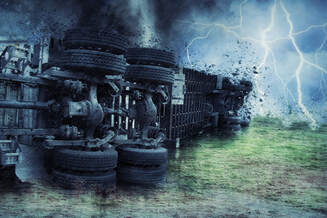
There are a few key differences between an accident involving private passenger vehicles and those that involve a semi-truck or tractor-trailer.
The most obvious difference is the size differential between a car and a semi, but when litigating these personal injury claims, there are other differences for a personal injury lawyer to consider. The Severity of Victim Injuries and Chances of Fatality are Greater
Fully loaded, a semi-truck weighs an average of 80,000 pounds. Passenger cars or SUVs, on the other hand, weigh a little over 4,000 pounds, on average, according to J.D. Power & Associates. The sheer difference in size between these two types of vehicles means that when they collide, the smaller vehicle – and its occupants, will suffer much more serious damage and injuries.
Life-changing injuries and fatalities are more common in accidents involving a semi-truck, which means the value of the victim’s claim will be much higher, especially if there is a fatality. A wrongful death claim is typically much higher than a personal injury claim. Even if all people involved survive, many victims may permanently lose physical abilities or the ability to work or live independently, which is a consideration when valuing the claim. If you are a victim of a trucking accident, or if your family member died as a result of a trucking accident, consider visiting with an experienced trucking accident attorney. Litigating Against Multiple Defendants
Most car crashes are caused by one driver being negligent (texting and driving, following too closely, not following traffic laws), and colliding with another driver. Although a truck driver may cause a crash in the same manner a car driver can, there are additional considerations for driver fault. Commercial truck drivers must pass a series of written and road tests and adhere to federal regulations about driving hours and ongoing safety training. If a driver is not properly trained or disregards safety standards, then a crash may be more likely to happen.
Furthermore, in a truck accident, multiple parties can share fault in the crash, not just the driver. Defendants in a semi-truck crash can include:
Specific Causation to Consider in Trucking Accidents
Plaintiff’s attorneys in a truck accident case must first determine all contributing causes of the collision and make a separate case for each one’s contributing negligence. For example, the trucking company may knowingly have hired someone with a poor driving record or may have tacitly encouraged drivers to spend more time driving than the federal mandate permits, cutting down delivery time for higher profits.
Alternatively, the truck may have been fundamentally unsafe due to a design or manufacturing flaw, and the crash would have been preventable if the truck had functioned properly. The trucking carrier is responsible for the overall maintenance of its fleet. If it fails to keep the rigs in good working condition and a crash is due to mechanical failure caused by a poorly maintained vehicle, then the trucking company would be liable for the crash. Truck Accidents are Often More Complex and Require More Resources
Proving causation in a truck accident requires a more in-depth investigation than in a car crash. Several factors can come into play with these cases, and a plaintiff’s lawyer may need more resources to investigate. The trucking company’s safety records and driver file are critical elements of the case, as is the police accident report.
Proper valuation of a plaintiff’s claim is also an important aspect of the case. The personal injury lawyer not only values the actual damages incurred by the plaintiff but may also need to estimate the financial impact of the person’s injuries on their future, from their job prospects to their ability to live independently. There is an incredibly well written article explaining in more detail about truck vs car accidents on TruckAccidentAttorneyNetwork.org. We recommend you read that blog as well as other well cited and researched articles. Punitive Damages in a Trucking Accident
Many trucking accidents involve punitive damages, as well, which may not always be a consideration in a collision between two passenger vehicles. If a trucking carrier consistently engages in illegal or unsafe practices, the plaintiff’s attorney may hold them fiscally accountable. Additionally, if a truck manufacturer knowingly releases a flawed product, then they, too, may be assessed punitive damages.
Litigating Truck Accident Cases Can Be More Complicated Than Litigating Other Traffic Accidents
A personal injury law firm familiar with federal and state trucking regulations and the potential liability of multiple parties can be more effective at successfully litigating truck accident cases. Many factors are in play that may not be present in a personal vehicle accident, and these cases may take longer to settle.
|
IE Legal Hub
Local legal information, published by local Inland Empire lawyers. Are you a local attorney?
Archives
July 2023
Categories
All
|

 RSS Feed
RSS Feed




